 |
Convert MPEG to JPG/JPEG Sequence
|
JPG/JPEG is a commonly used method of lossy compression
for digital photography (image). The degree of compression can be adjusted, allowing
a selectable tradeoff between storage size and image quality. JPEG typically achieves
10:1 compression with little perceptible loss in image quality.
MPEG to JPG/JPEG Converter Software converts MPEG to JPG/JPEG
sequence files. So, you could get every frame image of MPEG in
JPG/JPEG format. You can also set output frame rate and JPG/JPEG resolution in
the software. The output JPG/JPEG files look something like the following screen
shot.
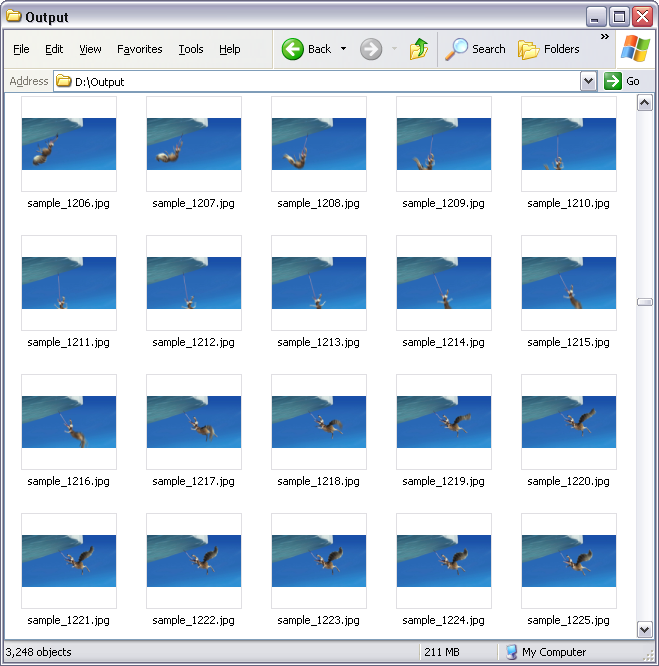
The software also supports other formats and portable devices such as FLAC, iPhone, 3G2, VCD, SPX (Speex), Android Phone, Windows Phone,
etc. The software could convert M4V to MP4, WebM to DTS, 3G2 to WMV, 3GP to PNG image sequence, DVR-MS to SWF, and so on.
MPEG to JPG/JPEG Software supports batch conversion and, is compatible
with Windows 10/8/7/Vista/XP/2000.

What is MPEG?
Popular video format standardized by the Moving Picture Experts Group (MPEG);
compressed using MPEG-1 or MPEG-2 compression; often used for creating
movies that are distributed over the Internet. Today, MPEG-1 has become
the most widely compatible lossy audio/video format in the world, and is
used in a large number of products and technologies. Perhaps the best-known
part of the MPEG-1 standard is the MP3 audio format it introduced. MPEG-21
is supposed to become a standard as a multimedia framework. MPEG encoding
can introduce blockiness, colour bleed and shimmering effects on video
and lack of detail and quantisation effects on audio. MPEG movies are typically
saved with an .MPG extension. The first MPEG meeting was in May 1988 in
Ottawa, Canada. As of late 2005, MPEG has grown to include approximately
350 members per meeting from various industries, universities, and research
institutions. MPEG also standardizes the protocol and syntax under which
it is possible to combine or multiplex audio data with video data to produce
a digital equivalent of a television program. MPEG-4 was created to stream
DVD quality video at lower data rates and smaller file sizes. MPEG-4 supports
video/audio "objects", 3D content, sprites, text and other media
types. MPEG-4 has become extremely popular due to the ability to fit a
two-hour movie to a CD file retaining comparatively high quality. MPEG
algorithms compress data to form small bits that can be easily transmitted
and then decompressed. The official name of MPEG-1 is International Standard
IS-11172. MPEG-21 (2001): Multimedia framework (MPEG-21). (ISO/IEC 21000)
MPEG describes this standard as a multimedia framework and provides for
intellectual property management and protection.
What is JPG?
Compressed image format standardized by the Joint Photographic Experts
Group (JPEG); commonly used for storing digital photos since the format
supports up to 24-bit color; therefore, most digital cameras save images
as JPG files by default. JPEG, which stands for Joint Photographic Experts
Group (the name of the group that created the standard), is a commonly
used lossy technique of compression for color photographic images. An image
in JPEG format has a '.jpg', '.jpeg', or '.jpe', extension. Motion JPEG
2000 is defined in ISO/IEC 15444-3 and in ITU-T T.802. It specifies the
use of the JPEG 2000 format for timed sequences of images (motion sequences),
possibly combined with audio, and composed into an overall presentation.
It also defines a file format, based on ISO base media file format (ISO
15444-12). Filename extensions for Motion JPEG 2000 video files are .mj2
and .mjp2 according to RFC 3745. JPG file extension (pronounced Jay Peg),
this is the right format for those photo images which must be very small
files, for example, for web sites or for email. These assertions are tested
on a large set of randomized input images, to handle the worst cases. The
former IEEE 1180-1990 standard contained some similar precision requirements.
The precision has a consequence on the implementation of decoders, and
it is critical because some encoding processes (notably used for encoding
sequences of images like MPEG) need to be able to construct, on the encoder
side, a reference decoded image. In order to support 8-bit precision per
pixel component output, dequantization and inverse DCT transforms are typically
implemented with at least 14-bit precision in optimized decoders.
How to Convert MPEG to JPG/JPEG Sequence?
- Free Download MPEG to JPG/JPEG
Converter Software
- Install the Program by Step-by-step Instructions
- Launch MPEG to JPG/JPEG Software
- Choose MPEG Files

Click "Add Files" to choose MPEG files.
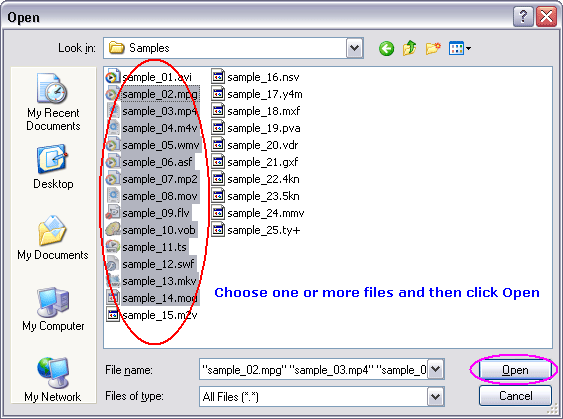
Choose one or more MPEG files you want to convert and then click Open.
MPEG to JPG/JPEG Software will open MPEG files and get file information
of the file such as width, height, frame rate, video bit rate, audio sample rate,
audio bit rate, audio channels, and then display the information of MPEG file
at conversion list.
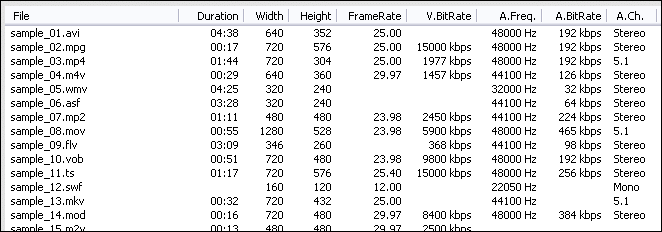
- Choose Output Format
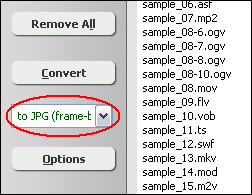
Click on combo-box of output format and then choose "to JPG (image sequence)".
- [Optional, for advanced user]
Set JPG Encoding Parameters
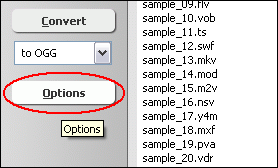
If you want to change JPG encoding parameters such as frame rate, video size,
aspect ratio, and so on, please click "Options".
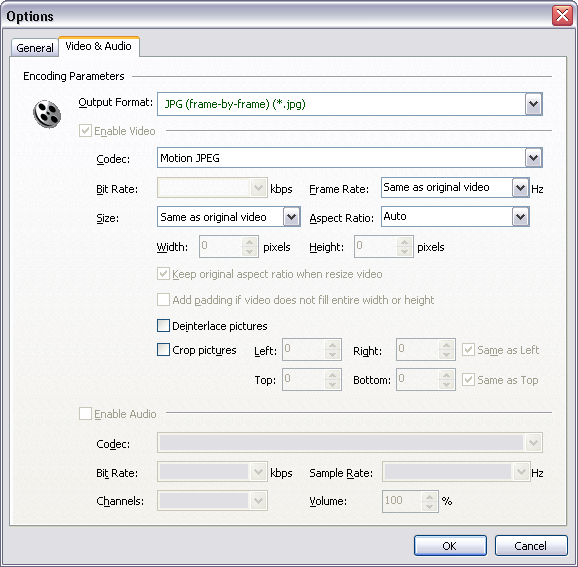
And then, switch to tab "Video & Audio" and choose "JPG
(image sequence)" at "Output Format", and then set options
for image encoding.
- Convert MPEG to JPG/JPEG
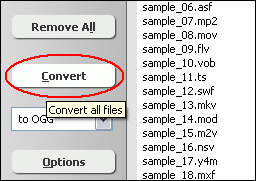
Click "Convert" to convert MPEG to JPG/JPEG sequence.

The software is converting MPEG files to JPG/JPEG.
- View and Browse JPG/JPEG Files
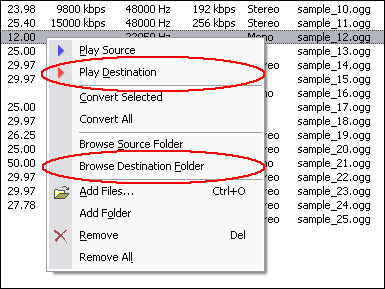
When conversion completes, you can right-click converted item and choose "Play
Destination" to view the first outputted JPG file; or choose "Browse
Destination Folder" to open Windows Explorer to browse the outputted JPG
files.
- Done
Top
MPEG to JPG/JPEG Software is 100% clean and safe to
install. It's certified by major download sites.

Convert MPEG to JPG/JPEG Related Topics:
|












